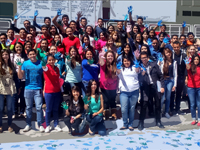29 February 2016 is Rare Disease Day! Read more about this year’s Theme and Slogan
Theme: Patient Voice
Slogan: Join us in making the voice of rare diseases heard
2016 marks the ninth year that the international rare disease community celebrates Rare Disease Day.
On 29 February 2016, people living with or affected by a rare disease, patient organisations, politicians, carers, medical professionals, researchers and industry will come together in solidarity to raise awareness of rare diseases.
The Rare Disease Day 2016 theme ‘Patient Voice’ recognises the crucial role that patients play in voicing their needs and in instigating change that improves their lives and the lives of their families and carers.
The Rare Disease Day 2016 slogan ‘Join us in making the voice of rare diseases heard’ appeals to a wider audience, those that are not living with or directly affected by a rare disease, to join the rare disease community in making known the impact of rare diseases. People living with a rare disease and their families are often isolated. The wider community can help to bring them out of this isolation.
Patients and patient advocates use their voice to bring about change that:
- Ensures that politicians continuously and increasingly acknowledge rare diseases as a public health policy priority at both national and international levels.
- Increases and improves rare disease research and orphan drug development.
- Achieves equal access to quality treatment and care at local, national and European levels, as well as earlier and better diagnosis of rare diseases.
- Supports the development and implementation of national plans and policies for rare diseases in a number of countries.
- Helps to reduce isolation sometimes felt by people living with a rare disease and their families.
Rare Disease Day amplifies the voice of rare disease patients so that it is heard all over the world.
The patient voice:
- Is stronger when patients receive training so that patient advocates are equipped with the skills and information that they need to be able to represent the patient voice at the local, national and international level, within and on behalf of their patient organisations.
- Is vital because rare disease patients are experts in their disease. In situations when there is often a lack of medical expertise or disease knowledge because a disease is so rare, patients develop expertise on treatment and care options. With this expertise, the voice of a rare disease patient is often more inherent to the decision-making process regarding their treatment or care options.
- Is increasingly present and respected in the medicines regulatory process, during which patients bring real-life perspective to the discussion. This voice needs to be encouraged to become stronger all along the life cycle of the R&D process, from the early stages of development of a medicine, right through to when the medicine is in use in a wider population of patients. This will help to ensure that medicines are developed more efficiently and in turn will result in patients accessing more, better and cheaper treatments at an earlier stage.
EURORDIS, whose mission is to be the voice of an estimated 30 million people living with a rare disease in Europe, supports patients to make their voice stronger through various initiatives and activities, including:
- The EURORDIS Access Campaign, which invites anybody living with a rare disease to voice the difficulties they experience accessing treatment or care through a questionnaire.
- The facilitation of the participation of patient advocates in numerous scientific committees and working parties at the European Medicines Agency and beyond.
- The EURORDIS ExPRESS Summer School, aimed at empowering patient representatives through training in the areas of clinical research, regulatory affairs and health-technology assessment.
- The EURORDIS Patient Voices Programme, created to collect patient opinions on transversal topics and include them in the policy and decision-making process and other regular consultations with patients.
- Rare Diseases International, the global voice for rare disease patients.
- RareConnect, the online network of rare disease communities that provides a forum for people living with or affected by rare diseases to voice their experiences and meet others living with the same rare disease.

